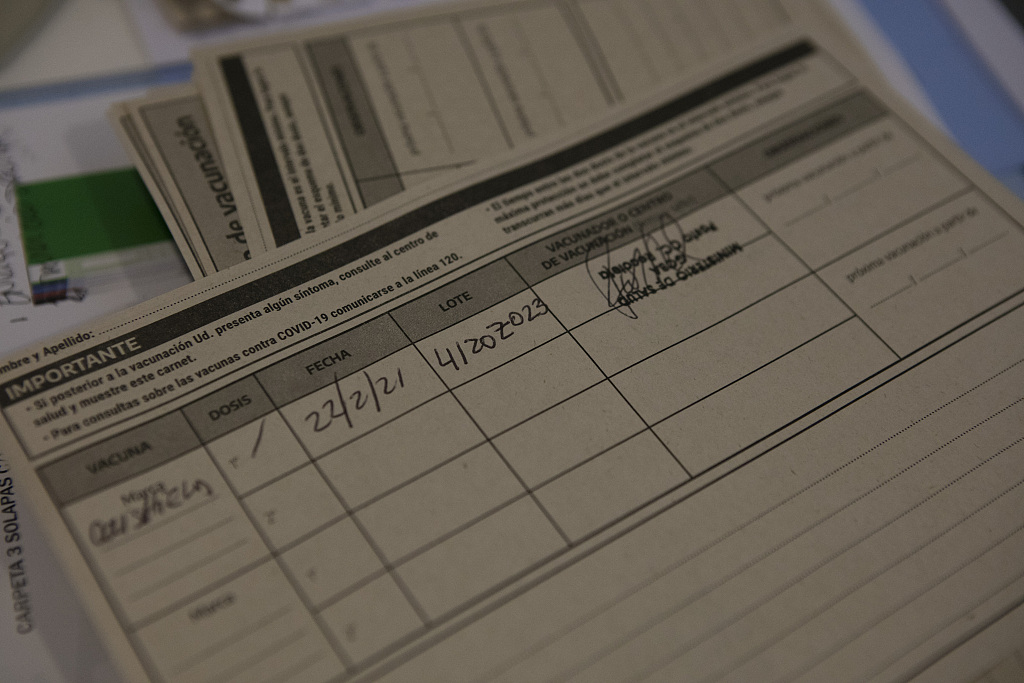
COVID-19 vaccination certificates /VCG
COVID-19 vaccination certificates /VCG
COVID-19 vaccination certificates have emerged as a new type of "passport" in some countries and regions, giving carriers a certain degree of freedom and normalcy with just a small piece of paper.
The increasingly demand for vaccine shots – or simply the certificate – have elicited a lucrative business for counterfeit coronavirus vaccines and fraudulent vaccination cards.
Check Point Research, a multinational service company specializing in cyber security, reported a trend of trading on forged negative COVID-19 test results and fake vaccine certificates on the dark web.
According to the report, fake "vaccine passports" can be sold for $250 – users simply need to send their personal information and the money, and the seller emails back the fake documents. While fake negative COVID-19 test results are for sale starting at just $25.
Most of the transactions are made by Bitcoin.
The trade of fraudulent vaccine certificates and vaccine shots are not only prevailing on dark websites, but also being reported on easily accessible websites like the U.S.'s Craigslist, eBay, and OfferUp, according to Chicago's NBC 5.
The blank cards are being sold online and printed in almost identical fonts as the official ones. Some of them are being sold for $200.
The report also spotted a 300-percent of increase in counterfeit COVID-19 vaccine advertisements on the dark web.
The currently number of reported sellers is over 1,200 with many based in the U.S. and European countries including Spain, Germany, France and Russia. The vaccines advertised include those from AstraZeneca, Johnson & Johnson, the Russian Sputnik and the Chinese Sinopharm vaccine.
The World Health Organization (WHO) has issued warning about counterfeit COVID-19 vaccines sold on the dark web on Friday at a press conference. It cautioned about "criminal groups" reusing empty vaccine vials and tampering with the COVID-19 vaccine supply chain.
"We urge all people not to buy vaccines outside government-run vaccination programs. Any vaccine outside these programs may be substandard or falsified, with the potential to cause serious harm," said WHO Director-General Tedros Adhanom Ghebreyesus.

German waitlist form for COVID-19 vaccination/ VCG
German waitlist form for COVID-19 vaccination/ VCG
A crucial piece of paper
While the global rollout of COVID-19 vaccinations continues to accelerate, it's noted that only around eight percent of people have received at least one dose, according to data compiled by the New York Times. Billions are still on the waitlist.
As a result, there's a strong and growing demand for vaccinations and certificates because of the greater freedoms they will give people.
Without an official database for verifying vaccinations, those little pieces of paper are currently the best source for proving vaccination status.
Check Point said the surge in vaccine ads could be due to people not wanting to wait for one.
"We believe this is because of a spike in demand from individuals who don't wish to wait weeks or months to receive their vaccination from their countries' governments," the company said in a blog post.
Meanwhile, the fraudulent vaccine cards can have serious consequences and perpetuate vaccine skepticism.
The Daily Beast reported on March 27 that more than six videos of forged vaccination certificates were called out on TikTok within a week, and all of them are posted by alleged health workers.
"I work at a pharmacy and grabbed blank ones for me and my hubby," wrote one of the alleged health care worker in the comments section of a TikTok, The Daily Beast reported.
Just before she wiped her TikTok account, the alleged health worker defended herself that "Stop hating on me! I don't care what any of you think. I did what is best for my husband and I."
Read more:
Are 'vaccination passports' the next turning point?
The 'vaccine passport' you might need to travel this summer

